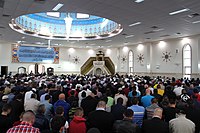| Part of a series on |
| Islam in Australia |
|---|
 |
| History |
|
| Mosques |
| Organisations |
| Islamic organisations in Australia |
| Groups |
| Events |
| National Mosque Open Day |
| People |
Halal literally means "permissible" in Arabic and refers to food items that are permissible to consume under Sharia law, whereas haram (lit. "unlawful") refers to any substance not permitted to consume. According to the Australian Food and Grocery Council, halal foods must be "free from any substance taken or extracted from a haram animal or ingredient (e.g. pigs, dogs, carnivorous animals, animals not slaughtered in compliance with Islamic rites); [be] made, processed, manufactured and/or stored by using utensils, equipment and/or machinery that has been cleaned according to Islamic law (e.g. not cleaned with alcohol); and [be] free from contact with, or being close to, a haram substance during preparation, manufacture, processing and storage (e.g. blood, alcohol, poisonous and intoxicating plants and insects such as worms [sic] and cockroaches)."[1]
The Australian Government does not have a formal role in labeling halal food for domestic consumption.[2]
Halal goods serve as part of the trade links between Australia and several Muslim countries, particularly Middle Eastern ones, although many non Muslim countries also form significant part of Halal products' consumer base. Halal meat and meat product exports to the Middle East and Southeast Asia have greatly increased from the 1970s onwards. This expansion was due in part to efforts of the Australian Federation of Islamic Councils.[3]: 151 Certification, which involves both costs[4] and restrictions,[5][6] is necessary to access this large export market.[7] The federal Department of Agriculture approves the certification of halal food for export to Islamic countries.[2]
- ^ "Halal Certification " Australian Food & Grocery Council". afgc.org.au. Archived from the original on 24 January 2015. Retrieved 20 January 2015.
- ^ a b Medhora, Shalailah (13 April 2015). "Barnaby Joyce defends halal after Coalition MPs express concern". The Guardian. Retrieved 13 April 2015.
- ^ Kabir, Nahid. "Muslims In Australia." Archived 4 December 2014 at the Wayback Machine Routledge. Accessed 17 November 2014.
- ^ Religious levy costs Queensland abattoirs thousands each month
- ^ "Queensland abattoirs hit with thousands in Halal certification fees". Food Magazine.
- ^ "Aussie firms paying inflated price to have Halal certification". NewsComAu.
- ^ Wong, James; Millie, Julian (12 February 2015). "Explainer: what is halal, and how does certification work?". The Conversation. Retrieved 12 February 2015.